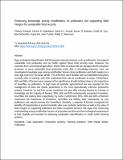| dc.description.abstract | Agro-ecological intensification (AEI) harnesses natural processes, such as pollination, that support sustainable crop production and can buffer against future food security risks. However, the transition from conventional agriculture, which relies on inputs that can damage natural ecosystem processes, to more sustainable food production under AEI, is knowledge-intensive. Here, we investigated knowledge gaps among smallholder farmers about pollinators and field margins in a bean agri-system in Tanzania. While 77% of farmers were familiar with and identified honeybees correctly prior to training, only 52% understood their role as a pollinator of crops. Furthermore, 80% and 98% of farmers were unaware of the significance of wild (solitary) bees or the importance of hoverflies as pollinators. A high level of synthetic agrochemical use was reported for the management of pests and weeds, particularly in the more agriculturally intensive production systems. However, an end-line survey conducted one year after training showed an increase in knowledge and the majority of farmers, 99%, 54% and 62% subsequently recognised honeybees, hoverflies and solitary bees respectively, by name. Furthermore, 95%, 69% and 60% of farmers understood the importance of honeybees, hoverflies and solitary bees respectively, as crop pollinators and natural enemies (for hoverflies). Similarly, a majority of farmers recognised the benefits of biopesticides as environmentally safer over synthetic pesticides as well as the value of field margins in supporting pollinators and other ecosystem services. We argue that, improving understanding among smallholder farmers of ecosystem services and their ecological requirements is both feasible and essential to achieving sustainable intensification in small holder farming systems. | en_US |

